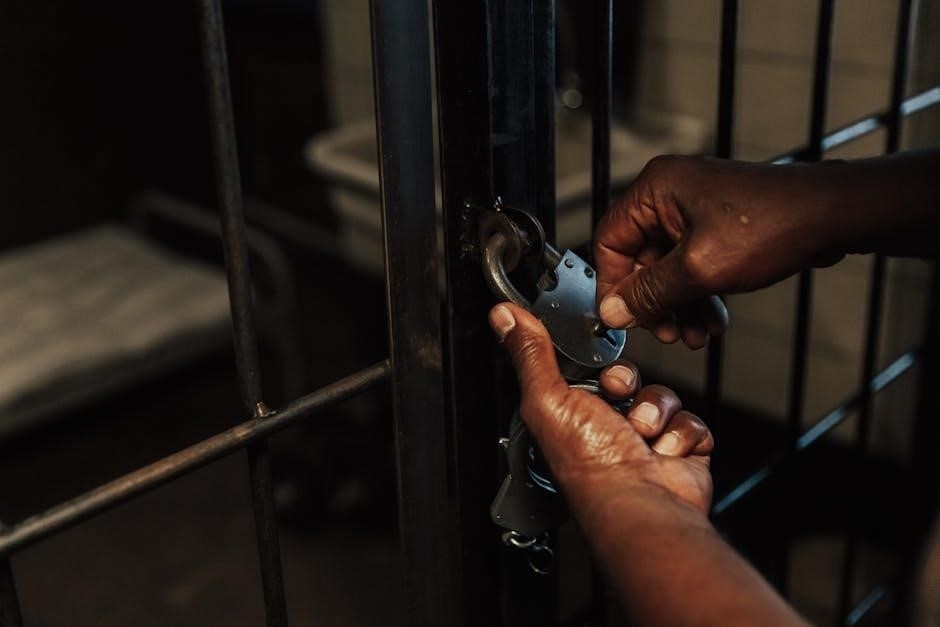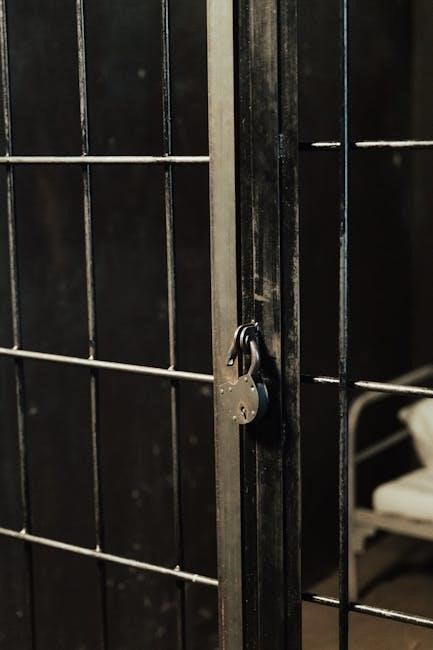Theoretical foundations of criminal justice provide an introduction to criminal justice theory, exploring system behavior, offender behavior, and their interconnections, guiding policy development and evidence-based practices․
Definition and Scope of Criminal Justice
The criminal justice system is a network of institutions and practices aimed at maintaining social order, enforcing laws, and delivering justice․ Its scope encompasses the detection, prosecution, and punishment of criminal offenses, as well as rehabilitation efforts․ Theoretical foundations emphasize understanding the interplay between system behavior and offender behavior, providing frameworks to analyze crime causation and societal responses․ These foundations guide policy development, evidence-based practices, and critical evaluations of justice systems․ By exploring historical and cultural contexts, criminal justice theory offers insights into the complexities of law enforcement, courts, and corrections, shaping ethical and effective approaches to crime prevention and societal safety․
Importance of Theoretical Foundations
Theoretical foundations are essential for understanding the complexities of crime and justice systems․ They provide frameworks to analyze criminal behavior, legal processes, and societal responses, guiding policy development and evidence-based practices․ These foundations help identify the root causes of crime, evaluate the effectiveness of justice systems, and inform ethical decision-making․ By grounding practices in theory, criminal justice professionals can address systemic issues, improve outcomes, and ensure fairness․ Theoretical insights also enable critical evaluations of justice systems, fostering continuous improvement and adaptation to evolving challenges․ Ultimately, they are vital for building a coherent and effective approach to crime prevention and justice administration․
Historical Development of Criminal Justice Theory
The historical development of criminal justice theory traces back to classical theories in the 18th century, which emphasized rational choice and deterrence․ Positivist approaches emerged in the 19th century, focusing on biological and environmental factors influencing crime․ The 20th century saw the rise of sociological theories, such as the Chicago School, which explored crime as a product of social environments․ These foundational theories have evolved over time, incorporating psychological and ecological perspectives․ Understanding this historical progression is crucial for grasping how modern criminal justice systems operate and how theories continue to shape policies and practices․ This evolution reflects society’s changing views on crime and justice․
Key Theoretical Frameworks in Criminal Justice
Classical theory, positivist theory, and the Chicago School are foundational frameworks shaping criminal justice․ They explore crime causation, system behavior, and societal influences, guiding policy and practice․
Classical Theory and Its Principles
Classical theory posits that individuals possess free will and choose to engage in criminal behavior based on rational decisions․ It emphasizes deterrence as a primary mechanism to prevent crime, suggesting that harsh punishments can discourage potential offenders․ This framework, rooted in the works of Cesare Beccaria and Jeremy Bentham, advocates for a rational approach to crime control, focusing on the consequences of actions rather than the causes․ Classical theory underpins the development of criminal justice systems, promoting clarity in laws, proportionate punishments, and the belief that crime can be reduced through swift and certain sanctions․
Positivist Theory and Its Contributions
Positivist theory emphasizes that criminal behavior is shaped by biological, psychological, and social factors beyond individual control․ It contrasts with classical theory by focusing on determinism rather than free will․ Positivists argue that crime is rooted in environmental influences, such as poverty, family dynamics, and mental health․ This perspective has led to the development of rehabilitation programs and scientific approaches to crime prevention․ Key contributors, like Cesare Lombroso and Émile Durkheim, laid the groundwork for understanding crime as a sociological phenomenon․ Positivist theory has significantly influenced criminal justice policies, advocating for tailored interventions to address the root causes of criminal behavior․
Chicago School and Ecological Theory
The Chicago School and ecological theory focus on the relationship between crime and environmental factors, particularly in urban areas․ Developed in the 1920s and 1930s, this theory emphasizes how social disorganization and neighborhood characteristics contribute to crime rates․ Scholars like Robert Park and Ernest Burgess introduced concepts such as concentric zones and natural areas, which describe how urban areas develop and influence criminal behavior․ The theory suggests that crime is not random but rather concentrated in areas with poverty, migration, and social instability․ This perspective has shaped community-based crime prevention strategies and remains a cornerstone of environmental criminology․
Strain Theory and Its Relevance
Strain theory, developed by Robert Merton, explains how societal pressures and structural inequalities lead individuals to engage in criminal behavior․ It posits that crime arises when individuals are unable to achieve culturally defined goals, such as financial success, through legitimate means․ This disjunction between goals and means creates strain, prompting individuals to adapt through innovative, ritualistic, or rebellious behaviors․ Strain theory is highly relevant as it highlights how socioeconomic factors and systemic inequalities contribute to crime, offering insights into crime causation and policy interventions aimed at reducing disparities and promoting social cohesion․
Social Learning Theory and Crime Causation
Social Learning Theory, developed by Albert Bandura, posits that individuals learn criminal behavior through observation, imitation, and reinforcement․ It emphasizes the role of environmental influences, such as family, peers, and community, in shaping behavior․ The theory suggests that crime is more likely when individuals are exposed to criminal models and receive rewards for deviant actions․ Over time, these behaviors are internalized, leading to a pattern of criminal conduct․ By focusing on learning processes and social interactions, this theory provides a framework for understanding crime causation and developing interventions aimed at reducing criminal behavior through behavioral modification and environmental change․

Theories of Crime Causation
Theories of crime causation explore the root causes of criminal behavior, examining biological, psychological, and sociological factors that contribute to crime and deviance in society․
Biological Theories of Crime
Biological theories of crime suggest that criminal behavior is influenced by genetic, neurological, and physiological factors․ These theories propose that biological traits, such as genetic predispositions, brain abnormalities, and imbalances in neurotransmitters, can predispose individuals to criminal behavior․ Historical perspectives, such as Lombroso’s “born criminal” theory, laid the groundwork for modern biological explanations․ Contemporary research explores the role of genetics, hormones, and brain structure in crime causation․ While these theories provide insights into the biological underpinnings of crime, they are often criticized for oversimplifying the complex interplay between biology and environment․ Understanding biological factors remains crucial for developing comprehensive crime prevention strategies․
Psychological Theories of Crime
Psychological theories of crime focus on mental processes and behavioral patterns that contribute to criminal behavior․ These theories suggest that crime arises from factors such as personality traits, cognitive distortions, and emotional instability․ Psychological perspectives often emphasize the role of individual experiences, learning, and mental health in shaping criminal tendencies․ For instance, theories like psychoanalysis and behavioral learning theory highlight how early life experiences and environmental influences can lead to criminal behavior․ Additionally, psychological assessments are widely used in criminal justice systems to profile offenders and predict recidivism․ While these theories provide valuable insights, they are often criticized for overlooking broader societal and structural factors․
Sociological Theories of Crime
Sociological theories of crime emphasize the role of social structures, cultural norms, and environmental factors in shaping criminal behavior․ These theories argue that crime is not solely an individual act but is influenced by broader societal conditions․ Strain theory, for example, suggests that crime arises from the disparity between societal goals and the means to achieve them․ Social learning theory posits that individuals learn criminal behavior through interactions with others․ Labeling theory highlights how societal labels can lead to deviance․ Sociological perspectives also examine the impact of poverty, inequality, and community dynamics on crime rates․ By focusing on systemic issues, these theories provide a framework for addressing crime through social reform and policy changes;

The Criminal Justice System Components
The criminal justice system comprises law enforcement, courts, and corrections, functioning together to maintain justice and order, supported by theoretical frameworks that guide their operations and interactions․
Law Enforcement and Its Theoretical Underpinnings
Law enforcement serves as the frontline of the criminal justice system, primarily responsible for maintaining order and enforcing laws․ Theoretical foundations, such as classical and positivist theories, shape its operations․ Classical theory emphasizes deterrence and punishment as key mechanisms to prevent crime, while positivist approaches focus on understanding the social and psychological factors that drive criminal behavior․ These frameworks guide law enforcement strategies, from community policing to evidence-based practices․ By integrating theoretical insights, law enforcement agencies can address the root causes of crime and improve public safety․ This blend of theory and practice ensures that policing is both effective and aligned with broader criminal justice goals․
Courts and the Adjudication Process
The courts play a central role in the criminal justice system, primarily responsible for the adjudication of criminal cases; Theoretical foundations, such as due process and the rule of law, underpin the court’s function of determining guilt or innocence․ These theories emphasize fairness, impartiality, and the protection of individual rights․ The adjudication process is guided by legal frameworks that ensure accountability while safeguarding against wrongful convictions․ By applying theoretical principles, courts aim to balance justice, retribution, and rehabilitation․ This ensures that the legal system operates ethically and effectively, upholding societal values and maintaining public trust in the criminal justice system․
Corrections and Rehabilitation Theories
Corrections and rehabilitation theories focus on the goals of punishment, reintegration, and reducing recidivism․ These theories emphasize the balance between accountability and the rehabilitation of offenders․ Rehabilitation theory, for instance, posits that offenders can change through education, counseling, and skill development․ Deterrence theory aims to prevent future crimes through punishment, while restorative justice seeks to repair harm to victims and communities․ Correctional practices are guided by these theoretical frameworks, ensuring a holistic approach to offender management․ By addressing the root causes of crime, rehabilitation theories aim to create safer societies and promote long-term behavioral change among offenders․

Theoretical Approaches to Criminal Justice Policy
Theoretical approaches to criminal justice policy provide frameworks for evidence-based practices, guiding effective crime prevention and rehabilitation strategies․
Deterrence Theory and Its Application
Deterrence theory posits that the threat of punishment deters individuals from committing crimes․ It operates through two mechanisms: specific deterrence, which targets the offender, and general deterrence, which aims to discourage others․ The theory emphasizes the certainty, severity, and swiftness of punishment as key factors in crime prevention․ In criminal justice policy, deterrence is applied through laws, sentencing guidelines, and law enforcement strategies․ However, its effectiveness is debated, as some argue that harsh punishments may not always reduce crime rates․ Despite this, deterrence remains a cornerstone of criminal justice systems, shaping policies aimed at maintaining social order and public safety․
Incapacitation Theory and Its Implications
Incapacitation theory focuses on preventing crime by removing offenders from society, thereby rendering them incapable of committing further crimes; This approach emphasizes punishment as a means of public protection rather than rehabilitation․ Incarceration is the primary method, aiming to incapacitate offenders and deter others․ While it prioritizes public safety, critics argue that it may lead to overcrowded prisons and recidivism upon release․ The theory also raises ethical concerns, as it prioritizes punishment over rehabilitation․ Despite these criticisms, incapacitation remains a key component of criminal justice systems, shaping policies that balance punishment with societal protection․ Its implications highlight the tension between security and rehabilitation in justice systems․
Restorative Justice and Its Theoretical Foundations
Restorative justice emphasizes repairing harm caused by crime, focusing on victim-offender reconciliation and community involvement․ Its theoretical foundations prioritize healing over punishment, aiming to address the root causes of crime․ This approach shifts the focus from state-centered punishment to a more holistic, inclusive process․ Restorative justice encourages accountability, empathy, and reparation, fostering a sense of responsibility among offenders․ By involving victims and communities, it seeks to rebuild trust and promote social cohesion; The theory critiques traditional punitive systems, advocating for a more humane and constructive approach to justice․ Its implications highlight the potential for crime reduction and rehabilitation through collaborative, restorative practices․

The Role of Criminology in Criminal Justice
Criminology provides theoretical frameworks to understand crime causation, informing criminal justice policies and practices․ It bridges theory and application, guiding evidence-based strategies for crime prevention and reduction․
Criminological Theory and Crime Prevention
Criminological theory plays a pivotal role in shaping strategies for crime prevention by providing frameworks to understand the root causes of criminal behavior․ These theories, such as routine activity theory and broken windows theory, help identify risk factors and intervene effectively․ By analyzing patterns and motivations, criminological theories inform evidence-based practices that address both individual and societal factors contributing to crime․ Effective crime prevention requires the integration of theoretical insights with practical strategies, ensuring policies are grounded in a deep understanding of criminal behavior and its contexts․ This approach fosters sustainable solutions that reduce crime rates and enhance community safety․
The Intersection of Criminology and Criminal Justice
The intersection of criminology and criminal justice lies in their shared goal of understanding and addressing crime within society․ Criminology provides the theoretical frameworks to explain the causes and consequences of criminal behavior, while criminal justice focuses on the practical application of these theories through law enforcement, courts, and corrections․ Together, they create a comprehensive approach to crime management, ensuring that policies and practices are informed by empirical research․ This integration enables the development of evidence-based strategies that not only punish offenders but also aim to prevent future crimes by addressing underlying societal issues․ Their collaboration is essential for creating a just and safe society․
Contemporary Criminological Perspectives
Contemporary criminological perspectives emphasize the integration of diverse theoretical frameworks to address modern crime challenges․ These approaches often focus on the interplay between individual, social, and structural factors, incorporating insights from sociology, psychology, and critical criminology․ Recent theories highlight the role of power dynamics, inequality, and systemic injustices in shaping criminal behavior․ They also explore the impact of globalization, technology, and cultural shifts on crime patterns․ By prioritizing empirical research and interdisciplinary collaboration, contemporary perspectives aim to develop innovative solutions to complex issues like cybercrime, organized crime, and racial disparities in the justice system․ These evolving theories reflect the dynamic nature of crime and society;

Theoretical Foundations of Criminal Justice Reform
Theoretical foundations of criminal justice reform encompass historical and modern approaches, guiding evidence-based practices to address systemic issues and improve justice outcomes․

Historical Reforms and Their Theoretical Bases
Historical reforms in criminal justice have been shaped by theoretical frameworks that address systemic issues and promote fairness․ Classical theory emphasized deterrence and rational choice, influencing early penal codes․ Positivist theory introduced biological and social factors, leading to rehabilitation-focused reforms․ The Chicago School and ecological theory highlighted environmental influences, prompting community-based interventions․ These theoretical foundations have guided reforms in law enforcement, courts, and corrections, aiming to balance punishment and rehabilitation․ Understanding these historical reforms provides insight into the evolution of criminal justice systems and their ongoing efforts to address crime and justice effectively․
Modern Reforms and Evidence-Based Practices
Modern criminal justice reforms emphasize evidence-based practices, rooted in theoretical frameworks like restorative justice and incapacitation theory․ These reforms aim to reduce recidivism and improve systemic fairness․ Technology, such as data analytics, is increasingly used to predict and prevent crime․ Policies like community policing and rehabilitation programs reflect a shift toward addressing root causes of crime․ Academic research and policy collaboration drive these reforms, ensuring practices are grounded in empirical evidence․ By integrating theory with practical solutions, modern reforms strive to create a more equitable and effective criminal justice system, addressing contemporary challenges while learning from historical approaches․
The Role of Theory in Shaping Criminal Justice Reform
Theoretical frameworks play a pivotal role in shaping criminal justice reform by providing a structured approach to understanding crime and justice systems․ These theories guide policymakers in identifying root causes of crime and developing evidence-based solutions․ For instance, theories like restorative justice and deterrence theory influence reforms aimed at reducing recidivism and enhancing fairness․ By grounding reforms in theoretical foundations, policymakers ensure that changes are systematic and aligned with long-term goals․ This integration of theory and practice fosters innovative solutions, such as community-based programs and rehabilitation initiatives, ultimately contributing to a more equitable and effective criminal justice system․

Theoretical Perspectives on Criminal Justice Ethics
Theoretical foundations of criminal justice ethics provide a moral framework for decision-making, emphasizing fairness, justice, and accountability․ These perspectives guide ethical practices within the criminal justice system․
Ethical Theories and Criminal Justice Practice
Ethical theories provide a moral framework for criminal justice practice, guiding decisions on fairness, accountability, and justice․ These theories, such as deontology and consequentialism, shape policies and procedures within the system․ They emphasize the balance between individual rights and societal safety, ensuring that practices align with moral principles․ Ethical theories also address issues like racial disparities, police conduct, and rehabilitation versus punishment․ By integrating these theories, criminal justice professionals can make informed, equitable decisions․ Theoretical foundations highlight the importance of ethical considerations in law enforcement, courts, and corrections, promoting a just and fair system for all individuals involved․

Moral Philosophy and Criminal Justice Decisions
Moral philosophy plays a crucial role in shaping criminal justice decisions, providing a framework for evaluating actions and policies․ Key theories like deontology, consequentialism, and virtue ethics guide decision-making, ensuring fairness and justice․ Deontology emphasizes adherence to moral duties, while consequentialism focuses on outcomes․ Virtue ethics highlights the importance of moral character in decision-makers․ These philosophical perspectives help address ethical dilemmas, such as balancing punishment with rehabilitation or ensuring equal treatment under the law․ By grounding decisions in moral philosophy, criminal justice systems can promote accountability, transparency, and the protection of human rights, fostering trust and legitimacy within society․
Theoretical Approaches to Justice and Fairness
Theoretical approaches to justice and fairness in criminal justice emphasize equity, impartiality, and the protection of human rights․ Distributive justice focuses on the fair allocation of resources and consequences, while procedural justice highlights the importance of transparent and unbiased processes․ Restorative justice prioritizes repairing harm and promoting reconciliation between offenders, victims, and communities․ These frameworks guide decision-making, ensuring that justice systems address systemic inequities and uphold moral principles․ By integrating these approaches, criminal justice systems can foster trust, accountability, and a commitment to fairness, ultimately contributing to a more just and equitable society․
Theoretical Foundations of Criminal Justice Research
Theoretical foundations of criminal justice are essential for understanding crime causation, legal systems, and societal responses․ They guide policy development, inform evidence-based practices, and provide frameworks for analyzing justice systems․
Research Methods in Criminal Justice Theory
Research methods in criminal justice theory are essential for understanding crime and justice systems․ These methods include quantitative and qualitative approaches, such as data collection, statistical analysis, and case studies․ They enable researchers to examine crime patterns, offender behavior, and system responses․ Theoretical frameworks guide the selection of research methods, ensuring studies align with foundational concepts․ For instance, quantitative methods measure crime rates and test hypotheses, while qualitative methods explore underlying causes and experiences․ By applying these methods, scholars can evaluate policies, identify trends, and inform evidence-based practices․ This integration of theory and research strengthens the field’s ability to address complex justice issues effectively․
The Role of Theory in Criminal Justice Research
Theoretical frameworks play a crucial role in criminal justice research by providing structured approaches to understanding complex issues․ Theory guides researchers in identifying patterns, explaining phenomena, and predicting outcomes․ It ensures that studies are grounded in established knowledge, enabling the development of hypotheses and research questions․ By connecting empirical observations to theoretical concepts, researchers can systematically investigate crime and justice systems․ Theory also aids in evaluating policies and practices, ensuring they are evidence-based and aligned with broader goals․ Ultimately, the role of theory in criminal justice research is to enhance understanding, inform decision-making, and contribute to the advancement of the field․
Applying Theoretical Frameworks to Real-World Issues
Applying theoretical frameworks to real-world issues in criminal justice enables practitioners and policymakers to address complex problems systematically․ These frameworks provide structured approaches to understanding crime patterns, offender behavior, and systemic challenges․ By aligning theory with practice, professionals can develop evidence-based policies and interventions․ For instance, theories like deterrence and incapacitation inform strategies for crime prevention and punishment․ Additionally, theoretical insights help address systemic issues such as recidivism, racial disparities, and victim support․ The practical application of theory ensures that criminal justice practices are grounded in validated knowledge, leading to more effective and equitable outcomes․ This integration of theory and practice is essential for advancing justice systems․
Theoretical foundations of criminal justice continue to evolve, shaping future practices and policies․ Emerging theories and evidence-based approaches will address contemporary challenges, ensuring equitable and effective justice systems․
The Evolution of Criminal Justice Theory
Theoretical foundations of criminal justice have evolved significantly over time, shaped by historical developments and shifting societal perspectives․ Early theories, such as classical and positivist approaches, laid the groundwork for understanding crime and justice systems․ These frameworks emphasized rational choice and biological factors, respectively, influencing policy and practice․ Over the 20th century, sociological theories emerged, focusing on environmental and structural causes of crime․ Contemporary theories integrate interdisciplinary insights, addressing complexities like systemic inequality and technological advancements․ This evolution reflects a growing understanding of crime as a multifaceted issue, requiring holistic approaches․ Continuous theoretical development ensures criminal justice systems remain responsive to emerging challenges and societal needs․
Emerging Theories and Their Potential Impact
Emerging theories in criminal justice, such as critical criminology and digital criminology, are reshaping understanding of crime and justice systems․ These frameworks emphasize systemic inequality, technology’s role in crime, and environmental impacts․ Critical criminology critiques power structures, while digital criminology addresses cybercrime and surveillance․ Green criminology highlights ecological crimes, urging sustainable justice practices․ These theories offer innovative perspectives, enabling policymakers to address modern challenges like cyberattacks and climate-related crimes․ By integrating interdisciplinary insights, emerging theories promote more equitable and adaptive justice systems, fostering a holistic approach to crime prevention and rehabilitation․ Their potential impact lies in creating a more just and responsive criminal justice framework for future societies․
The Importance of Continuous Theoretical Development
The continuous development of criminal justice theory is essential for addressing evolving crime patterns and societal changes․ As crime becomes more complex, theories must adapt to provide effective frameworks for understanding and responding to new challenges․ Emerging issues, such as cybercrime and environmental crimes, require innovative theoretical approaches․ Ongoing theoretical development ensures that criminal justice systems remain responsive, equitable, and evidence-based․ It fosters innovation in policy-making, law enforcement, and rehabilitation practices․ By staying attuned to global trends and interdisciplinary insights, theoretical advancements help create a more just and adaptive criminal justice system․ This evolution is critical for meeting the needs of future generations and ensuring public safety․
